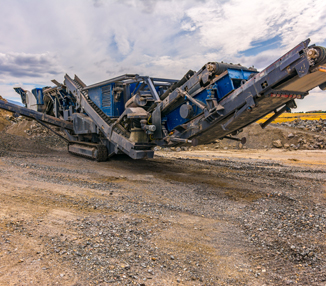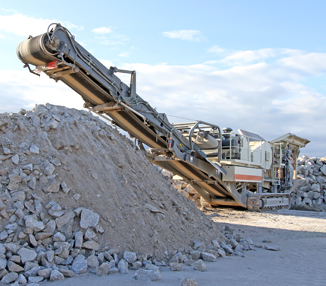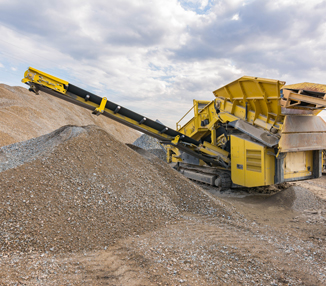


To crush and screen materials generated by mining, construction or quarrying activities, Dry Hire Online provides access to an extensive range of suitable equipment. Using our online database, we connect you with suppliers of reliable crushing and screening plant, saving time, money and helping to keep your project on track.
We provide access to crushing machines which process materials on site, supported by the right screening system to separate materials ready for their end use. You can also hire a range of related equipment such as conveyors, batch plant and radial stackers. No matter the size or scope of your quarrying, recycling, agricultural, construction or mining project, Dry Hire Online allows you to source the right equipment solution.
Search online
While different types of crushing plants work in different ways, all are designed to take the original material such as rock, concrete or demolition waste, and reduce particles to a desired size. This process can occur in multiple steps and using more than one type of crusher, with crushers categorised as primary and secondary (coarser end product) and tertiary and quaternary (finer end product).
Crushing buckets: These generally attach to excavators and are designed for efficiently crushing small amounts of material. Crusher buckets utilise the hydraulic system of the equipment they are fitted to, and are ideal for crushing materials onsite for re-use, or reducing volumes of material prior to offsite disposal.
Crusher buckets are used to process inert materials such as natural rock on mining sites through to manmade materials such bricks, tiles and paving on building demolition and construction sites.
Cone crushers: To crush medium to hard rocks, a cone crusher provides the optimum solution, using a rotating head to break rock into gradually smaller pieces as the material descends through the cone. While a cone crusher can process rocks from the first instance, they are generally adopted as a secondary crushing method and used when rock which is not intermixed with other metals or materials.
Tractor mounted rock crushers: Optimal for land clearing work, tractor mounted rock crushers are designed to process larger rock slabs and stones up to 50cm diameter. Tractor mounted rock crushers are a versatile piece of equipment most often used for clearing agricultural land, working with severely eroded land which contains exposed rock, or for working around orchards and vineyards.
These types of crushers come with fixed teeth rotors and are available in different weights and dimensions to match the site profile, crushing requirements and horsepower of the tractor in use. The capacity of a tractor mounted crusher varies from smaller entry level models which work in soil up to 20cm deep and stones up to 30cm diameter, to models which work to a depth of up to 50cm and manage materials up to 50cm diameter.
Search online
Impact crushers: Looking to crush mixed materials at the same time? Impact crushers can accommodate elements such as reinforcing bars, clay, wire mesh or other metals which may be mixed with the primary material. The process uses hammers and impact plates to repeatedly bounce materials between the two elements until the rock reaches the desired size. This allows for better control of the final material size and can manage the full range of rock densities from soft to hard, although they are primarily aimed at soft-medium rock.
Also known as hammer crushers, they are configured with a horizontal or vertical shaft (see below for more information on vertical shaft option). The horizontal shaft configuration is known for generating a uniform cubic product, with better control over the finished product size.
Vertical shaft impactors: Vertical shaft impactors (or vertical axis impactors) are well-suited to crushing materials into fine consistencies such as sand. Working in a similar way to impact crushers, the vertical shaft impactor uses impact and rotational energy to achieve uniform results. While the impact crusher is useful for primary, secondary and tertiary crushing applications, the vertical shaft impactor is recommended for secondary, tertiary and quaternary crushing applications when processing smaller feed materials.
Jaw Crushers: Known mostly as a primary crusher, a jaw crusher is the go-to product for the first stage of breaking up hard materials such as rock or concrete. The simple crushing mechanism involves a fixed plate and a swing plate which together form the “jaw” which traps and crushes the rock. As materials break down into smaller pies, they fall through the space in the crusher’s jaw. Most often the jaw crusher prepares larger blocks for secondary and tertiary crushing processes.
Search online
Once materials are crushed, the material may require screening prior to use or disposal. While some crushing plants can also screen, generally a separate screening solution is desirable. Screening machines are used to sort materials in the same manner as a sieve, using vibration and mesh sized to separate materials to the optimum size.
Screening Plants: Standard screening plants offer up to 3 different sized screens, allowing site materials to be separated into multiple sizes, with material typically being 10mm minus. Screening plants are either wet or dry processes, depending on the materials under scrutiny, and are used in the mining and mineral extraction industries, agricultural, recycling and aggregate processing operations. Screening can occur in a single screening process or in multiple stages, with material being sorted into smaller particles at each step.
Reclaimer screens / scalping screens: For larger rock sizes (500-600mm minus) reclaimer or scalping screens are recommended. Their range of mesh sizes allow larger rock pieces from quarries or construction sites to be processed, although they can also accommodate demolition waste such as bricks. The process involves reclaiming or “scalping” the oversized material away from the smaller pieces, collecting it for disposal or further processing. A scalping screen can be combined with a conveyor which sends the oversized product directly to a crushing plant for further processing.
Trommel screens: Instead of vibrating like a reclaimer screen, a trommel screen separates materials using an angled rotating chamber enclosed with mesh. Particles of the desired size pass through the mesh, while oversized material exits at the end of the rotating drum. Due to the turning and rolling of the material within the drum, any material lodged in the trommel screen is easily ejected, preventing screens from becoming blocked. The operation is dust-free, low noise and energy efficient, and commonly adopted for recycling, soil and compost systems.
Screening buckets: For smaller quantities, a screening bucket (generally attached to an excavator or backhoe) is a useful project tool. While slower than screening plant, screening buckets are popular for processing smaller amounts of natural materials onsite, allowing materials to be salvaged more efficiently. They are also useful for screening topsoil or recycling materials to remove stones, or for mixing materials such as sand and clay.
Search online
Hiring excavator online couldn’t be easier for both customers and those with Crushing and Screening rental equipment available. Those looking to hire an excavator have three options:
Suppliers looking to hire out their Crushing and Screening equipment simply register to advertise on our site and online inquiries are forwarded directly to them. Registered suppliers can view current “Wanted” ads posted by customers, and respond directly to requests.

While crushing plant and screening plant can be used as standalone equipment, they can also be joined with associated equipment to form a train or circuit. A combination such as “jaw crusher-impact crusher-scalping screen” can create an efficient onsite material handling circuit. Simply select your combination or call our team to discuss.
We also hire the following equipment which is often utilised in conjunction with screening and crushing tasks:
Batch Plant: These mobile plants are capable of mixing concrete onsite, reducing the reliance on concrete mixing trucks and transportation times and providing large amounts of concrete over extended time periods. As site needs change, having access to mixing onsite can be an invaluable time saver for small or large projects.
Conveyors: Where onsite processes need materials to be stockpiled or to be quickly relocated, access to a conveyor is essential. A mobile conveyor efficiently transfers materials across a site, can be standalone or work as part of a circuit, and can accommodate a broad range of materials including ore, woodchips, aggregates, coal, fertilizers, or grain.
Pugmills: These are an efficient way to blend materials such as concrete and road base onsite. They are designed to add moisture or other additives to a material (such as adding lime to cement as a stabiliser) in an efficient manner prior. Other applications include blending diverse materials prior to use as bedding soil, or to create cement-treated products.
Radial Stackers: Using a conveyor, a radial stacker works in a circular motion to stockpile material, making or separating piles to the required size in the space available. This type of operation minimises dust, creates well-formed piles and helps to reduce the amount of material handling. There are multiple types of radial stackers including fixed stacking conveyors, tower mounted or tyre-mounted, and kingpost.
Washing Plant: Specialty washing plant are available to further process material onsite to maximise yield and produce material matched to the application. A washing plant is able to perform a variety of tasks including scrubbing, classifying, decontaminating and desliming material.

Submit an enquiry today and Dry Hire Online will match you with the crushing and screening plant appropriate for your needs, providing costs and availability.
If you have equipment to rent, simply register as a supplier to advertise on our site and online enquiries will be quickly and efficiently forwarded to you.
Registered suppliers can also view ads posted by customers in the current “Wanted” section and make contact directly.
Search online
Our online database links you to available crushing and screening plant available in locations across Australia. Contact us today to let Dry Hire Online put you in touch with the nearest available equipment to help with your mining, quarrying or demolition project.
Search online